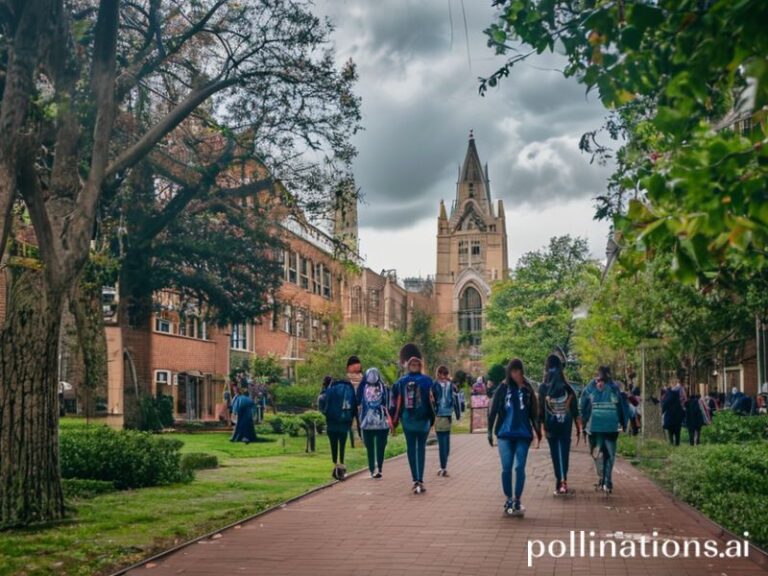Bonmati: The Catalan Rice Grain That Conquered Davos, Divided the WTO, and Became the Internet’s Favorite Carb
The Rice That Went to Davos: How a Grain Named Bonmati Became the World’s Most Diplomatic Carbohydrate
by Our Bureau Chief, currently recovering from an existential risotto in Bologna
PARIS—If geopolitics had a comfort food, it would be basmati’s cocky Catalan cousin, Bonmati. Officially, Bonmati is a short-grain variety cultivated in the paddies of Catalonia, trademarked by a co-op of farmers who apparently decided the region needed something more glamorous than paella rice and less alcoholic than cava. Unofficially, it is the edible equivalent of a LinkedIn influencer: everywhere, photogenic, and faintly suspicious.
Bonmati first sauntered onto the global stage when the Catalan Department of Agriculture—fresh out of independence posters and apparently bored—launched a campaign branding it “the geopolitical grain.” Their pitch deck, leaked to a bemused El País reporter, claimed Bonmati could “de-escalate trade wars” because it pairs equally well with Korean gochujang and Texan brisket. In other words, it is the Switzerland of starches, minus the money-laundering.
The rice’s soft launch coincided with the 2023 World Economic Forum, where delegates who had spent the day arguing about carbon credits tucked into dainty cones of Bonmati arancini handed out by models dressed as scarecrows. One hedge-fund vegan was overheard whispering that the grain “felt ethically neutral,” which is Davos-speak for “I don’t have to read the label.” By the time the forum ended, Bonmati had trended higher than “AI ethics” and just below “private jet shaming,” an algorithmic sweet spot previously occupied only by oat milk.
Naturally, the World Trade Organization perked up. Geneva’s technocrats, who can spot a supply-chain fad at fifty paces, convened an emergency session titled “Rice, Rights, and Rule-Making.” The Indian delegation, protective of its own basmati GI (Geographical Indication) status, accused Bonmati of “cultural dilution,” which is the polite way of saying identity theft with better marketing. Pakistan, never one to miss a border skirmish, threatened retaliatory tariffs on Catalan olive oil. Somewhere in the back row, Laos quietly wondered why no one ever fights over sticky rice.
Meanwhile, Silicon Valley smelled disruption. A San Francisco start-up unveiled “Bonmate,” a blockchain-verified grain that promises to trace every kernel from paddy to plate, minting NFTs of each grain so tech bros can literally own their carbs. Early adopters paid $3.50 per grain—roughly the GDP per capita of a small Pacific nation—before discovering that NFTs do not, in fact, make risotto creamier. The company pivoted to “rice as a service,” offering monthly subscriptions that deliver exactly 200 grams, because apparently we cannot be trusted with an entire kilo without algorithmic supervision.
The environmental lobby weighed in next. Greenpeace calculated that shipping Bonmati from Catalonia to Singapore emits 2.7 kilos of CO₂ per serving, or roughly the same as a medium-sized guilt trip. In response, the marketing team rolled out “Bonmati Blue,” a variety allegedly irrigated exclusively with recycled tears of climate activists. Sales tripled among affluent urbanites who prefer their sustainability pre-packaged.
Not to be outdone, China’s Ministry of Agriculture announced its own rival, “BoMati,” grown on vertical farms outside Shenzhen under 24-hour LED surveillance. The packaging features a QR code that, when scanned, plays a patriotic rap about food security. Early taste tests suggest it has the terroir of a server rack, but state media assures citizens it is “algorithmically delicious.”
Back in Catalonia, the farmers’ co-op has trademarked the phrase “Rice Without Borders,” apparently unaware that borders are precisely what everyone else is arguing about. Their latest press release promises a Bonmati pop-up at COP29, serving paella in edible cups made of compressed carbon credits. Greta Thunberg has already RSVP’d “maybe.”
So what does Bonmati mean for the world? On the surface, very little: it is still just rice. Yet in its glossy, globe-trotting ascent we see the entire farce of modern consumption—how a humble grain can be weaponized, sanctified, tokenized, and monetized until it costs more per ounce than printer ink. Bonmati proves that if you wrap nationalism, sustainability, and venture capital in a neat paella ball, the planet will queue up, credit card in hand, asking for seconds.
In the end, humanity may not agree on tariffs, borders, or the optimal temperature of the planet, but give us a trendy carbohydrate and we’ll pretend everything is al dente. Bonmati: the rice that united the world in mutual irritation. Pass the soy sauce—or is that cultural appropriation now?







